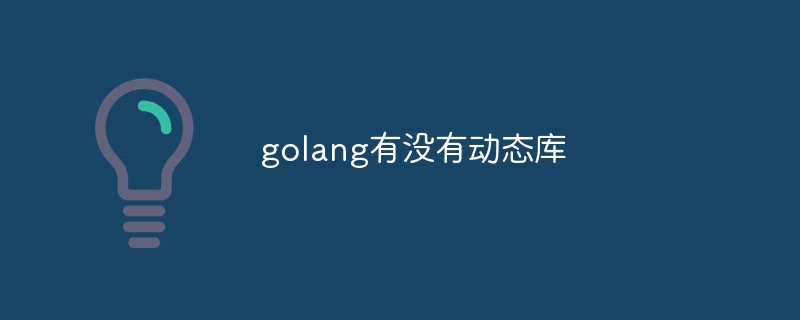
Golang does not have a dynamic library. You need to use external functions and cgo mechanisms to use dynamic libraries in golang programs. A dynamic library, also known as a shared library or dynamic link library, is a file that contains code and data that can be shared and loaded by different programs. Compared with static libraries, dynamic libraries have higher flexibility and portability. At runtime, the program can dynamically load and link the dynamic library to use the functions and data in it.

The operating environment of this article: Windows 10 system, go1.20 version, DELL G3 computer.
Golang is an open source programming language designed to simplify and improve the efficiency of software development. However, Golang's standard library provides many powerful functions, but in some cases it may be necessary to use third-party libraries to extend its functionality. One of the common requirements is to use dynamic libraries.
A dynamic library, also known as a shared library or dynamic link library, is a file that contains code and data that can be shared and loaded by different programs. Compared with static libraries, dynamic libraries have higher flexibility and portability. At runtime, the program can dynamically load and link the dynamic library to use the functions and data in it.
In contrast, Golang itself does not directly support the function of dynamic libraries. This is because Golang pursues static linking, that is, compiling all code and dependencies into the final executable file. The benefit of this approach is that it makes it easier to deploy and distribute programs without having to worry about dynamic library dependencies.
However, in some cases, it may still be necessary to use dynamic libraries. For example, when you need to interact with an existing library written in C or C++, or when you need to use a specific operating system feature that is only available through a dynamic library. In this case, we can use Golang's external functions and cgo mechanism to interact with the dynamic library.
External functions are a feature that allows Golang programs to call functions written in external languages. These functions are declared using the "extern" keyword, and they are called like other functions in the Golang program. However, to be able to call an external function, we need to provide the declaration of the function and the path to the dynamic library where the function resides.
A more advanced method is to use the cgo mechanism. cgo is a feature provided by Golang, which allows Golang programs to directly call C code. Using cgo, we can write the implementation of the C function in the Golang program and compile it together with the Golang code into the final executable file.
For the use of dynamic libraries, cgo can help us bypass the restrictions of static linking. By using the #cgo directive, we can declare certain functions in the Golang program as external functions and specify in which dynamic library their implementation is located. cgo will automatically handle the underlying linking and loading process, allowing Golang programs to interact with dynamic libraries.
In summary, although Golang itself does not directly support dynamic libraries, we can still use dynamic libraries in Golang programs by using external functions and the cgo mechanism. This gives us greater flexibility to develop applications using Golang when we need to interact with existing libraries or operating system features. However, when using dynamic libraries, we need to pay attention to some potential issues, such as dependencies and cross-platformness, to ensure program compatibility and portability.
The above is the detailed content of Does golang have a dynamic library?. For more information, please follow other related articles on the PHP Chinese website!
 How to define variables in golang
How to define variables in golang
 What are the data conversion methods in golang?
What are the data conversion methods in golang?
 What are the commonly used libraries in golang?
What are the commonly used libraries in golang?
 What is the difference between golang and python
What is the difference between golang and python
 geforce 940mx
geforce 940mx
 Interview assessment tools
Interview assessment tools
 What does ping mean?
What does ping mean?
 You need permission from admin to make changes to this file
You need permission from admin to make changes to this file
 ORACLEDISTINCT
ORACLEDISTINCT